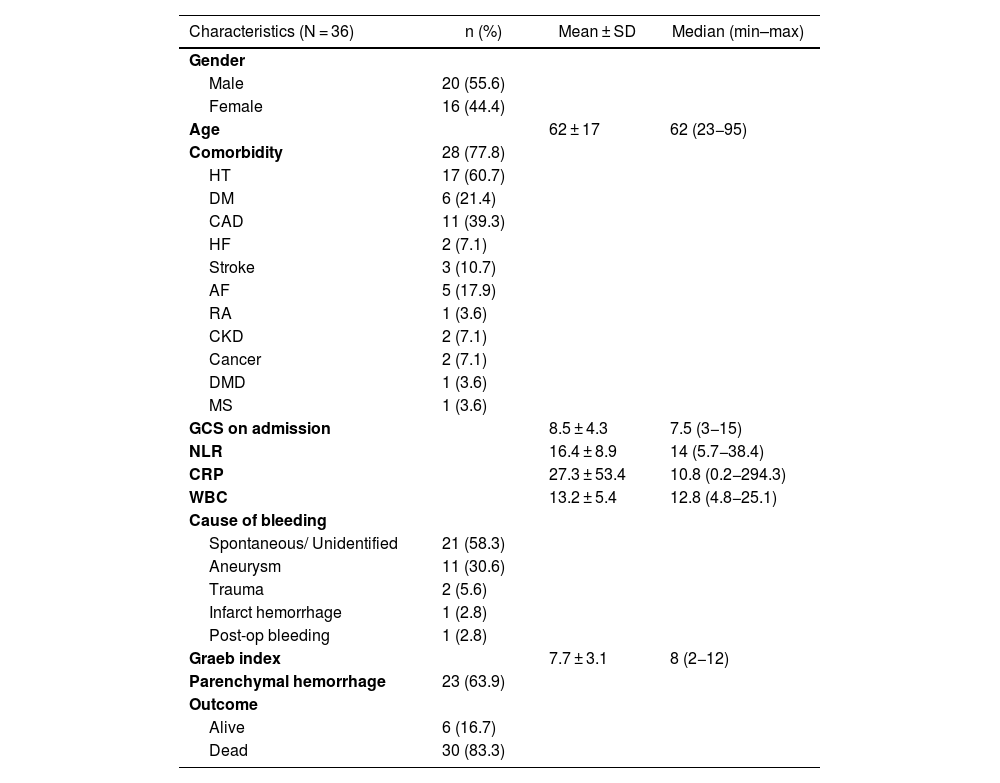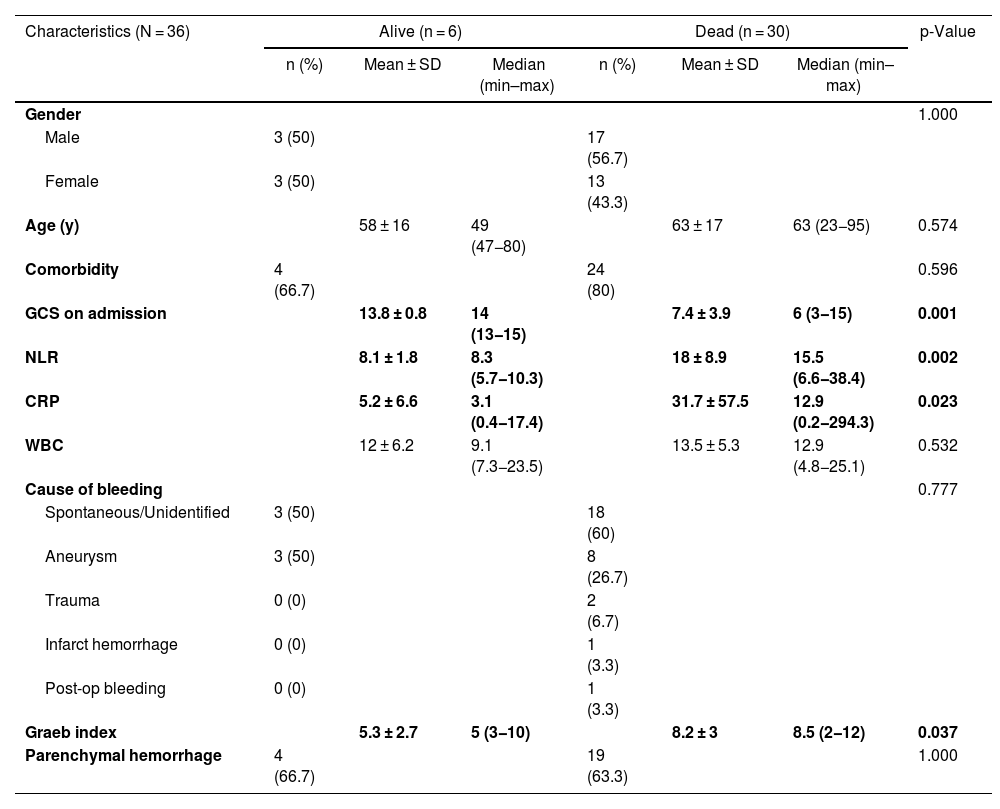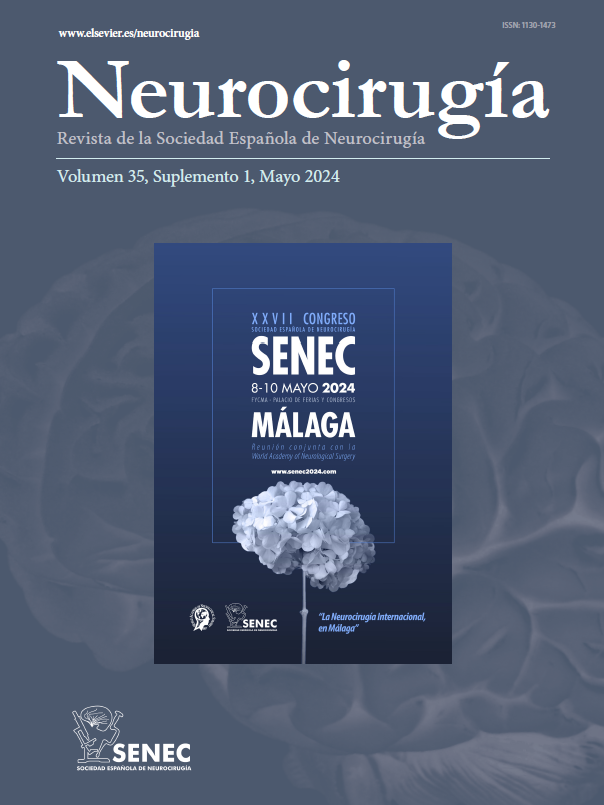Intraventricular hemorrhages (IVH) are common pathologies in neurosurgery practice and are associated with the worst clinical outcome among all intracranial hemorrhages. Blood in the ventricles is thought to worsen the clinical condition by triggering inflammatory processes. In recent years, NLR value is a frequently used inflammatory parameter, and there are many publications reporting that a high NLR value is an important marker in predicting the severity of inflammation.
Our study aimed to evaluate the effect of NLR values at admission on the clinical outcome of patients undergoing EVD due to IVH in our clinic.
Material and methodsIn our study, age and gender data, admission Glasgow Coma Scale (GCS), NLR value at the time of admission and clinical status at discharge of 36 patients, who underwent EVD following IVH in our hospital neurosurgery clinic between 2019 and 2024, were examined.
ResultsOf the 36 cases in our study, 16 were female and 20 were male. For all cases, the mean age was 61.88, and the mean GCS values at admission were calculated as 8.5. In the laboratory of our hospital, the normal NLR range was determined as 0.78-3.53, and the mean NLR values at admission were evaluated as 16.57. When the clinical outcomes of the cases were examined, it was seen that 30 cases ended with exitus after intensive care follow-up, and 6 cases were discharged with good clinical outcomes (GCS:15). The mean NLR value was calculated as 18.00 for the patients who ended with exitus and 8.12 for the patients discharged with good clinical outcomes.
ConclusionNLR, which has been used to determine the severity of inflammation in recent years, has been reported to be a marker that can predict clinical outcomes of many diseases. In our study, NLR was observed to be high at admission in all cases, but it was significantly higher in the cases ending with exitus than in the cases not ending with exitus. As a result, it is thought that NLR value is a parameter that can be used to predict the clinical course in IVH patients undergoing EVD.
Las hemorragias intraventriculares (Hiv) son patologías comunes en la práctica de la neurocirugía y se asocian con el peor resultado clínico entre todas las hemorragias intracraneales. Se cree que la sangre en los ventrículos empeora la condición clínica al desencadenar procesos inflamatorios. En los últimos años, el valor NLR es un parámetro inflamatorio utilizado con frecuencia y hay muchas publicaciones que informan que un valor NLR alto es un marcador importante para predecir la gravedad de la inflamación.
Nuestro estudio tuvo como objetivo evaluar el efecto de los valores de NLR al ingreso sobre el resultado clínico de los pacientes sometidos a EVE debido a Hiv en nuestra clínica.
Material y métodosEn nuestro estudio se utilizaron datos de edad y sexo, escala de coma de Glasgow (GCS) al ingreso, valor de NLR en el momento del ingreso y estado clínico al alta de 36 pacientes, a los que se les realizó EVE tras Hiv en la clínica de neurocirugía de nuestro hospital entre 2019 y 2024, fueron examinados.
ResultadosDe los 36 casos de nuestro estudio, 16 fueron mujeres y 20 hombres. Para todos los casos, la edad media fue de 61,88 años y los valores medios de GCS al ingreso se calcularon como 8,5. En el laboratorio de nuestro hospital, el rango normal de NLR se determinó entre 0,78-3,53 y los valores medios de NLR al ingreso se evaluaron como 16,57. Cuando se examinaron los resultados clínicos de los casos, se observó que 30 casos terminaron con exitus después del seguimiento en cuidados intensivos y 6 casos fueron dados de alta con buenos resultados clínicos (GCS:15). El valor medio del INL se calculó como 18,00 para los pacientes que terminaron con exitus y 8,12 para los pacientes dados de alta con buena evolución clínica.
ConclusiónSe ha informado que el NLR, que se ha utilizado para determinar la gravedad de la inflamación en los últimos años, es un marcador que puede predecir los resultados clínicos de muchas enfermedades. En nuestro estudio, se observó que el INL al ingreso era elevado en todos los casos, pero fue significativamente mayor en los casos que terminaron en exitus que en los casos que no terminaron en exitus. Como resultado, se cree que el valor NLR es un parámetro que puede usarse para predecir el curso clínico en pacientes con Hiv sometidos a EVE.
Article

If it is the first time you have accessed you can obtain your credentials by contacting Elsevier Spain in suscripciones@elsevier.com or by calling our Customer Service at902 88 87 40 if you are calling from Spain or at +34 932 418 800 (from 9 to 18h., GMT + 1) if you are calling outside of Spain.
If you already have your login data, please click here .
If you have forgotten your password you can you can recover it by clicking here and selecting the option ¿I have forgotten my password¿.











